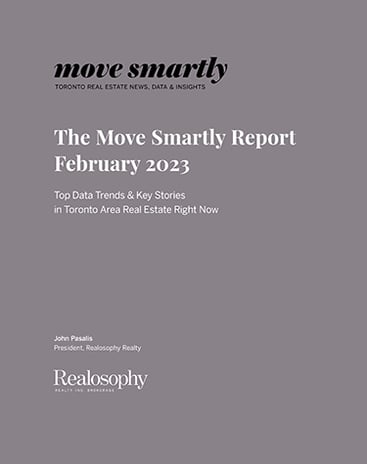Toronto area sales levels continue to hit historical lows, but low listing levels keep prices flat.
As Featured in the monthly Move Smartly Report:
FREE MONTHLY WEBINAR: The Market Now with John Pasalis - Thurs Feb 16th 12PM ET
Join John Pasalis, report author, leading market analyst and Move Smartly contributor, and President of Realosophy Realty, and in a free monthly webinar as he discusses key highlights this month's report and answers your questions. A must see for well-informed Toronto area real estate consumers.
Register now to get recording of latest session and access to future sessions.
The Market Now
Toronto’s housing market has started 2023 a bit busier and more competitive than most people in the real estate industry were expecting.
Mortgage brokers have noted an increase in demand from buyers starting their search and we saw that translate into stronger competition for homes, particularly during the second half of January. I discuss these early trends in the Data Dive section in this month's report.
Looking at the most recent monthly statistics for the Greater Toronto Area (GTA) market available, for January 2023, we’re seeing that even as sales numbers remain extremely low, home prices have stabilized since July in part because there are relatively few homes available for sale.
The average price for a house was $1,272,381 in January, down 24% from the most recent peak of $1,679,429 in February 2022, and down 22% over the same month last year. The median house price in January was $1,110,000, down 25% from $1,485,000 in February, and down 23% over last year.
House sales in January were down 40% over last year while new house listings were down 15% compared to last year. The number of houses available for sale at the end of the month, or active listings, was up 94% over last year, when demand was notably high.
The Months of Inventory (MOI) which is a measure of inventory relative to the number of sales each month (see Monthly Statistics section later in this report for more information on this measure) moved up slightly to 2.6 MOI in January, indicating tight supply conditions.
The average price for a condominium (condo) fell to $704,784 in January, down 16% from the most recent peak of $840,444 in March 2022, and down 10% over last year. The median price for a condo in January was $645,000, down from $777,000 in March and down 12% over last year.
Condo sales in January were down 52% over last year and well below pre Covid-19 pandemic sales volumes for the month in January 2020. New condo listings were up 4% over last year while the number of active condo listings was up 149% over last year. The MOI increased slightly to 3.8 MOI in January, indicating that supply is slightly less constrained for condos than for houses.
See next for the monthly statistics for the entire Toronto Area, including house, condo and regional breakdowns.
Monthly Statistics
House Statistics
House sales (low-rise freehold detached, semi-detached, townhouse, etc.) in the Greater Toronto Area (GTA) in January 2023 were down 40% over the same month last year and well below historic sales volumes for the month of January.
New house listings in January were down 10% over last year and well below historic sales volumes for the month of January.
The number of houses available for sale (“active listings”) was up 94% when compared to the same month last year, but still well below pre-Covid levels for the month of January. It’s worth noting that the extremely low inventory levels during the first quarter of 2022 was due to a surge in demand as the market accelerated towards the peak in February 2022.
The Months of Inventory ratio (MOI) looks at the number of homes available for sale in a given month divided by the number of homes that sold in that month. It answers the following question: If no more homes came on the market for sale, how long would it take for all the existing homes on the market to sell given the current level of demand?
The higher the MOI, the cooler the market is. A balanced market (a market where prices are neither rising nor falling) is one where MOI is between four to six months. The lower the MOI, the more rapidly we would expect prices to rise.
While the current level of MOI gives us clues into how competitive the market is on-the-ground today, the direction it is moving in also gives us some clues into where the market may be heading.
The MOI for houses increased slightly to 2.6 MOI in January.
The share of houses selling for more than the owner’s asking price increased slightly to 28% in January.
The average price for a house in January was $1,272,381 in January 2023, well below the peak of $1,679,429 reached in February and down 22% when compared to the same month last year.
The median house price in January was $1,110,000, down 23% over last year, and below the peak of $1,485,000 reached in February.
The median is calculated by ordering all the sale prices in a given month and then selecting the price that is in the midpoint of that list such that half of all home sales were above that price and half are below that price. Economists often prefer the median price over the average because it is less sensitive to big increases in the sale of high-end or low-end homes in a given month which can skew the average price.
Condo Statistics
Condo (condominiums, including condo apartments, condo townhouses, etc.) sales in the Toronto area in January 2023 were down 52% over last year and well below pre-COVID sales volumes for the month of January.
New condo listings were up 4% in January over last year.
The number of condos available for sale at the end of the month, or active listings, was up 149% over last year.
Condo inventory levels increased slightly to 3.8 MOI in January.
The share of condos selling for over the asking price remained unchanged at 17% in January.
The average price for a condo in January was $704,784, down from the peak of $840,444 in March, and down 10% over last year. The median price for a condo in January was $638,000, down 12% over last year, and down from the March peak of $777,000.
Regional Trends
Houses
Average prices were down over last year across all five regions with Peel, Durham and Halton seeing the biggest decline in prices. Sales were down significantly across all regions and inventory levels were well ahead of last year’s level.
Condos
Average condo prices were down over last year in Durham, Peel and Halton down, with Toronto and York seeing little change. Sales were down significantly across all regions and inventory levels were well ahead of last year’s level.
Browse Real-Time Market Trends on Movesmartly.com:
See Market Performance by Neighbourhood Map, All Toronto and the GTA
Greater Toronto Area Market Trends
Top Image Credit: Getty/iStock
The Move Smartly monthly report is powered by Realosophy Realty, an innovative residential real estate brokerage in Toronto. A leader in real estate analytics, Realosophy educates consumers at Realosophy.com and MoveSmartly.com and helps clients make better decisions when buying and selling a home.
John Pasalis is President of Realosophy Realty. A specialist in real estate data analysis, John’s research focuses on unlocking micro trends in the Greater Toronto Area real estate market. His research has been utilized by the Bank of Canada, the Canadian Mortgage and Housing Corporation (CMHC) and the International Monetary Fund (IMF).






